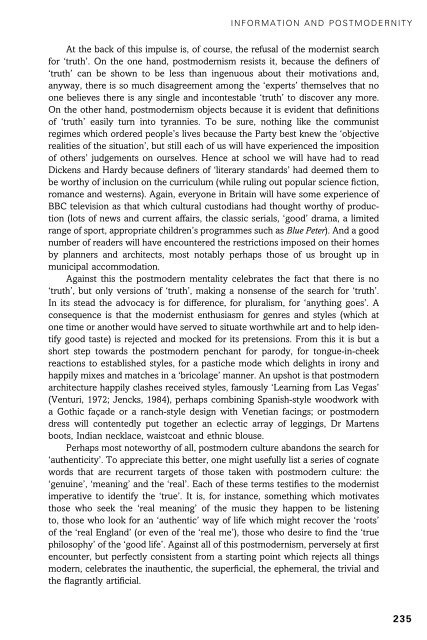Theories of the Information Society, Third Edition - Cryptome
Theories of the Information Society, Third Edition - Cryptome
Theories of the Information Society, Third Edition - Cryptome
Create successful ePaper yourself
Turn your PDF publications into a flip-book with our unique Google optimized e-Paper software.
INFORMATION AND POSTMODERNITY<br />
1<br />
1<br />
1<br />
2<br />
1<br />
1<br />
At <strong>the</strong> back <strong>of</strong> this impulse is, <strong>of</strong> course, <strong>the</strong> refusal <strong>of</strong> <strong>the</strong> modernist search<br />
for ‘truth’. On <strong>the</strong> one hand, postmodernism resists it, because <strong>the</strong> definers <strong>of</strong><br />
‘truth’ can be shown to be less than ingenuous about <strong>the</strong>ir motivations and,<br />
anyway, <strong>the</strong>re is so much disagreement among <strong>the</strong> ‘experts’ <strong>the</strong>mselves that no<br />
one believes <strong>the</strong>re is any single and incontestable ‘truth’ to discover any more.<br />
On <strong>the</strong> o<strong>the</strong>r hand, postmodernism objects because it is evident that definitions<br />
<strong>of</strong> ‘truth’ easily turn into tyrannies. To be sure, nothing like <strong>the</strong> communist<br />
regimes which ordered people’s lives because <strong>the</strong> Party best knew <strong>the</strong> ‘objective<br />
realities <strong>of</strong> <strong>the</strong> situation’, but still each <strong>of</strong> us will have experienced <strong>the</strong> imposition<br />
<strong>of</strong> o<strong>the</strong>rs’ judgements on ourselves. Hence at school we will have had to read<br />
Dickens and Hardy because definers <strong>of</strong> ‘literary standards’ had deemed <strong>the</strong>m to<br />
be worthy <strong>of</strong> inclusion on <strong>the</strong> curriculum (while ruling out popular science fiction,<br />
romance and westerns). Again, everyone in Britain will have some experience <strong>of</strong><br />
BBC television as that which cultural custodians had thought worthy <strong>of</strong> production<br />
(lots <strong>of</strong> news and current affairs, <strong>the</strong> classic serials, ‘good’ drama, a limited<br />
range <strong>of</strong> sport, appropriate children’s programmes such as Blue Peter). And a good<br />
number <strong>of</strong> readers will have encountered <strong>the</strong> restrictions imposed on <strong>the</strong>ir homes<br />
by planners and architects, most notably perhaps those <strong>of</strong> us brought up in<br />
municipal accommodation.<br />
Against this <strong>the</strong> postmodern mentality celebrates <strong>the</strong> fact that <strong>the</strong>re is no<br />
‘truth’, but only versions <strong>of</strong> ‘truth’, making a nonsense <strong>of</strong> <strong>the</strong> search for ‘truth’.<br />
In its stead <strong>the</strong> advocacy is for difference, for pluralism, for ‘anything goes’. A<br />
consequence is that <strong>the</strong> modernist enthusiasm for genres and styles (which at<br />
one time or ano<strong>the</strong>r would have served to situate worthwhile art and to help identify<br />
good taste) is rejected and mocked for its pretensions. From this it is but a<br />
short step towards <strong>the</strong> postmodern penchant for parody, for tongue-in-cheek<br />
reactions to established styles, for a pastiche mode which delights in irony and<br />
happily mixes and matches in a ‘bricolage’ manner. An upshot is that postmodern<br />
architecture happily clashes received styles, famously ‘Learning from Las Vegas’<br />
(Venturi, 1972; Jencks, 1984), perhaps combining Spanish-style woodwork with<br />
a Gothic façade or a ranch-style design with Venetian facings; or postmodern<br />
dress will contentedly put toge<strong>the</strong>r an eclectic array <strong>of</strong> leggings, Dr Martens<br />
boots, Indian necklace, waistcoat and ethnic blouse.<br />
Perhaps most noteworthy <strong>of</strong> all, postmodern culture abandons <strong>the</strong> search for<br />
‘au<strong>the</strong>nticity’. To appreciate this better, one might usefully list a series <strong>of</strong> cognate<br />
words that are recurrent targets <strong>of</strong> those taken with postmodern culture: <strong>the</strong><br />
‘genuine’, ‘meaning’ and <strong>the</strong> ‘real’. Each <strong>of</strong> <strong>the</strong>se terms testifies to <strong>the</strong> modernist<br />
imperative to identify <strong>the</strong> ‘true’. It is, for instance, something which motivates<br />
those who seek <strong>the</strong> ‘real meaning’ <strong>of</strong> <strong>the</strong> music <strong>the</strong>y happen to be listening<br />
to, those who look for an ‘au<strong>the</strong>ntic’ way <strong>of</strong> life which might recover <strong>the</strong> ‘roots’<br />
<strong>of</strong> <strong>the</strong> ‘real England’ (or even <strong>of</strong> <strong>the</strong> ‘real me’), those who desire to find <strong>the</strong> ‘true<br />
philosophy’ <strong>of</strong> <strong>the</strong> ‘good life’. Against all <strong>of</strong> this postmodernism, perversely at first<br />
encounter, but perfectly consistent from a starting point which rejects all things<br />
modern, celebrates <strong>the</strong> inau<strong>the</strong>ntic, <strong>the</strong> superficial, <strong>the</strong> ephemeral, <strong>the</strong> trivial and<br />
<strong>the</strong> flagrantly artificial.<br />
235
















